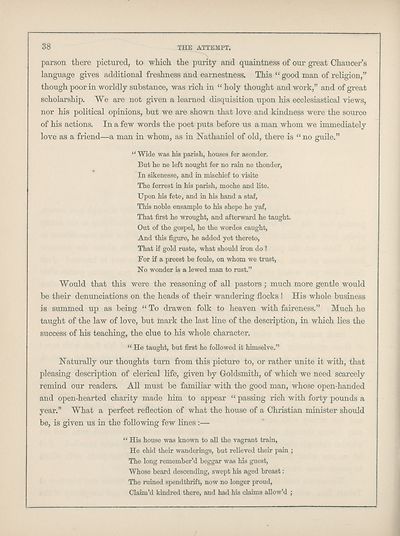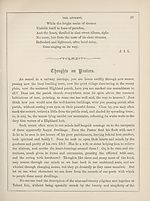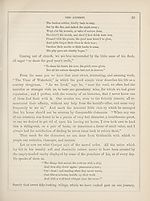Download files
Complete book:
Individual page:
Thumbnail gallery: Grid view | List view

38 THE ATTEMPT.
parson there pictured, to which the purity and quaintness of our great Chaucer's
language gives additional freshness and earnestness. This " good man of religion,"
though poor in worldly substance, was rich in " holy thought and work," and of great
scholarship. We are not given a learned disquisition upon his ecclesiastical views,
nor his political opinions, but we are shown that love and kindness were the source
of his actions. In a few words the poet puts before us a man whom we immediately
love as a friend—a man in whom, as in Nathaniel of old, there is " no guile."
" Wide was his parish, houses fer asonder.
But he ne left nought fer no rain ne thonder,
In sikenesse, and in mischief to visite
The ferrest in his parish, moohe and lite.
Upon his fete, and in his hand a staf,
This noble ensample to his shepe he yaf,
That first he wrought, and afterward he taught.
Out of the gospel, he the wordes caught,
And this figure, he added yet thereto,
That if gold ruste, what should iron do ?
For if a preest be foule, on whom we trust,
No wonder is a lewed man to rust."
Would that this were the reasoning of all pastors; much more gentle would
be their denunciations on the heads of their wandering flocks ! His whole business
is summed up as being " To drawen folk to heaven with faireness." Much he
taught of the law of love, but mark the last line of the description, in which lies the
success of his teaching, the clue to his whole character.
" He taught, but first he followed it himselve."
Naturally our thoughts turn from this picture to, or rather unite it with, that
pleasing description of clerical life, given by Goldsmith, of which we need scarcely
remind our readers. All must be familiar with the good man, whose open-handed
and open-hearted charity made him to appear " passing rich with forty pounds a
year," What a perfect reflection of what the house of a Christian minister should
be, is given us in the following few lines :—
" His house was known to all the vagrant train,
He chid their wanderings, but relieved their pain ;
The long remember'd beggar was his guest,
Whose beard descending, swept his aged breast:
The ruined spendthrift, now no longer proud,
Claim'd kindred there, and had his claims aJlow'd ;
parson there pictured, to which the purity and quaintness of our great Chaucer's
language gives additional freshness and earnestness. This " good man of religion,"
though poor in worldly substance, was rich in " holy thought and work," and of great
scholarship. We are not given a learned disquisition upon his ecclesiastical views,
nor his political opinions, but we are shown that love and kindness were the source
of his actions. In a few words the poet puts before us a man whom we immediately
love as a friend—a man in whom, as in Nathaniel of old, there is " no guile."
" Wide was his parish, houses fer asonder.
But he ne left nought fer no rain ne thonder,
In sikenesse, and in mischief to visite
The ferrest in his parish, moohe and lite.
Upon his fete, and in his hand a staf,
This noble ensample to his shepe he yaf,
That first he wrought, and afterward he taught.
Out of the gospel, he the wordes caught,
And this figure, he added yet thereto,
That if gold ruste, what should iron do ?
For if a preest be foule, on whom we trust,
No wonder is a lewed man to rust."
Would that this were the reasoning of all pastors; much more gentle would
be their denunciations on the heads of their wandering flocks ! His whole business
is summed up as being " To drawen folk to heaven with faireness." Much he
taught of the law of love, but mark the last line of the description, in which lies the
success of his teaching, the clue to his whole character.
" He taught, but first he followed it himselve."
Naturally our thoughts turn from this picture to, or rather unite it with, that
pleasing description of clerical life, given by Goldsmith, of which we need scarcely
remind our readers. All must be familiar with the good man, whose open-handed
and open-hearted charity made him to appear " passing rich with forty pounds a
year," What a perfect reflection of what the house of a Christian minister should
be, is given us in the following few lines :—
" His house was known to all the vagrant train,
He chid their wanderings, but relieved their pain ;
The long remember'd beggar was his guest,
Whose beard descending, swept his aged breast:
The ruined spendthrift, now no longer proud,
Claim'd kindred there, and had his claims aJlow'd ;
Set display mode to: Large image | Transcription
Images and transcriptions on this page, including medium image downloads, may be used under the Creative Commons Attribution 4.0 International Licence unless otherwise stated. ![]()
| Ladies' Edinburgh Debating Society publications > Attempt > Volume 3 > (52) Page 38 |
|---|
| Permanent URL | https://digital.nls.uk/104343856 |
|---|
| Attribution and copyright: |
|
|---|

